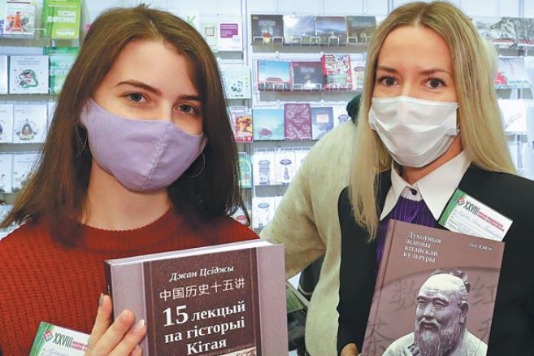BRI partners find classic path to learning
[ad_1]
A Ukrainian edition of the first volume of
Xi Jinping: The governance of China released in Kiev on June 30. XINHUA
The Greats of Chinese Literature Help Turn a New Leaf in Cultural Diffusion
Editor’s note: People-to-people exchanges strengthen ties between countries participating in the Belt and Road Initiative. This column celebrates the efforts of those working for a common future.
For Giorgia Solazzo, an Italian lover of Chinese literature, any notion of linguistic differences as an obstacle to understanding another culture is left at the door of her local library.
The 24-year-old student can delve into the works of her favorite authors among the shelves of Chinese literature in her city library near Milan. And she can thank an army of translators and others behind a burgeoning industry which, around the world, introduces Chinese literary talent to readers in local languages.
“Almost all libraries have works by Chinese authors translated into Italian,†says Solazzo.
Additionally, there are heated discussions on Italian social media platforms about Chinese authors and books about China, she says.
For the Italian bookworm, Chinese literature is distinguished by the way it often draws heavily on the history of China itself.
“Most of the time, the novel or its setting refers to real events that happened in the past,†says Solazzo. “It is quite useful because one can acquire both historical and literary knowledge.”
Solazzo and other Italian fans of Chinese literature are the beneficiaries of increased cooperation in the field of publishing between the countries involved in the Belt and Road Initiative (BRI) proposed by China. The cooperation has paid off, with more books being imported into participating country markets since the initiative was unveiled in 2013, according to publishing industry insiders. And this demand has occupied translators more than ever.
Too bad for the language barriers. The efforts of publishing houses and their translators allow people to gain better access to the cultures of often distant nations, in keeping with the ever-growing reach of the BIS itself.
According to the second volume of the B&R Publishing Cooperation and Development Report released by the Chinese Academy of Press and Publishing in November 2020, 273 Chinese agencies had established links with 79 publishing agencies in the countries involved in the BIS in 2019. The number of copyright title sales agreements between China and the BIS countries increased from 3,808 in 2016 to 11,282 in 2019.
Chen Yonggang, vice president of China Publishing Group Corporation, or CPG, said that since the BIS was proposed nearly ten years ago, the group has strengthened cooperation with its overseas peers in publishing translated works. . Each year, the CPG authorizes the publication of approximately 1,000 Chinese books in other countries under copyright provisions, and most of these agreements are made with peers in BIS countries.
“The BIS has dramatically expanded the reach of CPG’s international copyright trade and helped us increase multilingual copyright exports,†he says. “The translation of classical works into several languages ​​is a fundamental part of the exchange and mutual learning between different civilizations.”
Growing interest
The growing interest of foreigners in learning Chinese offers a new opportunity for Chinese publishers.
To exploit this wealth, the Commercial Press division of the CPG has been translating Chinese dictionaries (the Xinhua dictionary and the modern Chinese dictionary) into 15 languages ​​since 2017, with the help of partners from the BIS countries.
“International publishing cooperation on such a scale is rarely seen in the world,†Chen said.
He specifies that each year, the CPG selects quality books for translation from among the 10,000 or so books it has published.
“The China-themed books that we have selected and translated have been warmly welcomed by overseas publishers, because not only do we present Chinese classic books to them, but also listen to their advice and market demand,†he said. Chen said. “Since last year, CPG has been promoting books on China’s poverty reduction efforts, which have garnered a surprisingly active response from their overseas counterparts.
In addition to introducing Chinese books to overseas markets, Chinese publishers have also brought classics from other countries to Chinese readers, adhering to the spirit of promoting exchange and mutual learning among people of all countries. nations.
CPG’s popular literature publishing house has translated a wide range of foreign publications with global influence into Chinese. The Harry Potter series that she introduced in China has gained great popularity among Chinese readers who relish the adventures of the wizard boy.
In recent years, classical works translated from Arab countries have also started to gain the attention of Chinese readers, Chen says.
“We will continue to import classical works of outstanding authors from BIS countries, and assume the historic responsibility and mission to absorb the benefits of civilizations and cultures of various countries and serve the development of China’s modernization. “Chen said.
Ahmed Alsaid, managing director of Bayt Elhekma Group for Cultural (Egypt-China-UAE) Co, says his Cairo-based company has published around 600 books on China covering a wide range of topics including literature, economics, politics, children’s picture books and novels.
“When we started to publish Chinese books, we tried to choose books that best represent Chinese characteristics and explain what China really looks like, because there were few books about China in Arab countries at this time. era, â€says Alsaid.
As a result, the company began with translations of a series of books on China’s political and economic situation.
With the growing presence of Chinese-themed books in the Arab market, Alsaid says his business is now focused on translating and publishing Chinese literary works.
[ad_2]

